Last spring Southeastern Baptist Theological Seminary hosted a casual conversation on the topic of worship with Bruce Little, Andy Davis, and Daniel Renstrom.
Listen here or watch below.
Last spring Southeastern Baptist Theological Seminary hosted a casual conversation on the topic of worship with Bruce Little, Andy Davis, and Daniel Renstrom.
Listen here or watch below.
Out of all the special days in the Christian calendar the one I love the most is Easter. Actually, I love the whole week leading up to the climax of Easter Sunday. Significant gospel truth and grace saturate each day. I also love Easter because it gives us an excuse to sing one of Charles Wesley’s greatest hymns: “Christ the Lord is Risen Today.”
 For almost 300 years Wesley’s anthem of triumph has rung out in Christ’s church. Tim Challies writes, “The earliest forms of the hymn can be traced back to a Latin text from the 14th century. In 1708 the four Latin stanzas were translated into English and published by J. Walsh in Lyra Davidica under the title “Jesus Christ Is Risen Today.” A few decades later, in 1739, a modified version was published by John and Charles Wesley (Charles is pictured to the right) in Hymns and Sacred Poems under the title “Hymn for Easter Day.” It is this version, later shortened and supplemented with the “Alleluia” refrain, that has become the hymn that remains so popular today.”
For almost 300 years Wesley’s anthem of triumph has rung out in Christ’s church. Tim Challies writes, “The earliest forms of the hymn can be traced back to a Latin text from the 14th century. In 1708 the four Latin stanzas were translated into English and published by J. Walsh in Lyra Davidica under the title “Jesus Christ Is Risen Today.” A few decades later, in 1739, a modified version was published by John and Charles Wesley (Charles is pictured to the right) in Hymns and Sacred Poems under the title “Hymn for Easter Day.” It is this version, later shortened and supplemented with the “Alleluia” refrain, that has become the hymn that remains so popular today.”
Many of the famous Wesley songs are full of stanzas churches rarely sing. Most famously, “O For a Thousand Tongues to Sing” has 19 different verses! “Christ the Lord is Risen Today” has eleven and each one shouts forth the glory of Christ’s victory. A great devotional practice for this week would be to meditate on a few stanzas of the hymn each day. Here are all 11:
If you’re a bit shy of pulling the trigger on having your church sing some Wesley this weekend you might consider this arrangement from NCC:
There are few things in this world that stir my soul like the nostalgic power of Christmas hymns and carols. In my estimation, the king of all carols is Charles Wesley’s “Come Thou Long Expected Jesus.”
It was first published in 1744 in Charles Wesley’s Hymns for the Nativity of Our Lord, a little collection so popular that it was reprinted 20 times during Wesley’s lifetime. Some people think it may have been the first hymn Wesley wrote. If so, his first at-bat was an out-of-the-park grand slam. “Come Thou Long Expected Jesus” is a perfect portrayal of how to rightly communicate truth in a song. Every line is dripping with profound and searching theology. The phrases are carefully order to exalt Christ.
In short, our churches need this hymn. Let’s give it to ’em with delight each year. Here are three different arrangements for you to consider, from the traditional to the creative.
Come thou long expected Jesus
Born to set thy people free
From our fears and sins release us
Let us find our rest in thee
Israel’s strength and consolation
Hope of all the earth thou art
Dear desire of every nation
Joy of every longing heart
Born thy people to deliver
Born a child and yet a king
Born to reign forever
Now thy gracious kingdom bring
By thine own eternal spirit
Rule in all our hearts alone
By thine all sufficient merit
Raise us to thy glorious throne
Truth-filled and gospel-saturated hymns have power to sustain and strengthen.
Our congregations need songs that speak to the fullness of human experience – songs of adoration, celebration, lamentation, confession, and supplication. You can discern much from the songs a church sings. Not just their theology, but their understanding of the Christian life. The Christian life is a pilgrim life (Heb. 10:11; 1 Pet. 2:11), full of pains and sorrows on our journey toward heaven. And we need songs to carry us on the way.
One old hymn that preaches truth into our pilgrimage with moving clarity is Henry Francis Lyte’s “Jesus I My Cross Have Taken.” Originally set to a Mozart melody, the men of Indelible Grace reworked back in 2001 and it’s what a hymn should be.
Check out IG’s hymn-sing recording below and the different arrangements at the bottom.
1. Jesus, I my cross have taken,
All to leave and follow Thee.
Destitute, despised, forsaken,
Thou from hence my all shall be.
Perish every fond ambition,
All Ive sought or hoped or known.
Yet how rich is my condition!
God and heaven are still my own.
2. Let the world despise and leave me,
They have left my Savior, too.
Human hearts and looks deceive me;
Thou art not, like them, untrue.
O while Thou dost smile upon me,
God of wisdom, love, and might,
Foes may hate and friends disown me,
Show Thy face and all is bright.
3. Man may trouble and distress me,
Twill but drive me to Thy breast.
Life with trials hard may press me;
Heaven will bring me sweeter rest.
Oh, tis not in grief to harm me
While Thy love is left to me;
Oh, twere not in joy to charm me,
Were that joy unmixed with Thee.
4. Go, then, earthly fame and treasure,
Come disaster, scorn and pain
In Thy service, pain is pleasure,
With Thy favor, loss is gain
I have called Thee Abba Father,
I have stayed my heart on Thee
Storms may howl, and clouds may gather;
All must work for good to me.
5. Soul, then know thy full salvation
Rise oer sin and fear and care
Joy to find in every station,
Something still to do or bear.
Think what Spirit dwells within thee,
Think what Fathers smiles are thine,
Think that Jesus died to win thee,
Child of heaven, canst thou repine.
6. Haste thee on from grace to glory,
Armed by faith, and winged by prayer.
Heavens eternal days before thee,
Gods own hand shall guide us there.
Soon shall close thy earthly mission,
Soon shall pass thy pilgrim days,
Hope shall change to glad fruition,
Faith to sight, and prayer to praise.
We are currently preaching through the book of Job at IDC and I’ve thus been ravaging the hymnals for anything that speaks to suffering in the Christian life.
Just the other day I came across a hymn from the late 19th century, which I had forgotten about, entitled “Jesus I Come to Thee.” I first learned it over a decade ago at the Reformed University Fellowship located at Southern Methodist University. The lyrics are searching and the melody is memorable.
I think a better arrangement of the music can be had, but this Indelible Grace recording will nevertheless captures the usefulness of Sleeper’s song:
1. Out of my bondage, sorrow and night,
Jesus, I come; Jesus I come.
Into Thy freedom, gladness and light,
Jesus, I come to Thee.
Out of my sickness into Thy health,
Out of my wanting and into Thy wealth,
Out of my sin and into Thyself,
Jesus, I come to Thee.
2. Out of my shameful failure and loss,
Jesus, I come; Jesus, I come.
Into the glorious gain of Thy cross,
Jesus, I come to Thee.
Out of earth’s sorrows into Thy balm,
Out of life’s storms and into Thy calm,
Out of distress into jubilant psalm,
Jesus, I come to Thee.
3. Out of unrest and arrogant pride,
Jesus, I come; Jesus, I come.
Into Thy blessed will to abide,
Jesus, I come to Thee.
Out of myself to dwell in Thy love,
Out of despair into raptures above,
Upward forever on wings like a dove,
Jesus, I come to Thee.
4. Out of the fear and dread of the tomb,
Jesus, I come; Jesus, I come.
Into the joy and light of Thy home,
Jesus, I come to Thee.
Out of the depths of ruin untold,
Into the peace of Thy sheltering fold,
Ever Thy glorious face to behold,
Jesus, I come to Thee.
I love to read. By God’s grace I am a pretty fast reader; I usually read a couple books each week. I find it helpful to summarize my thoughts on each book and I offer those thoughts in the hope that you will be encouraged to either read or pass over the given title.
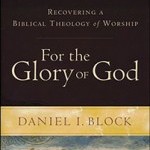 For the Glory of God: Recovering a Biblical Theology of Worship by Daniel Block. I love to see scholars branch out and publish works outside their ordinary discipline. The church needs well-rounded scholars who can speak knowledgeably and winsomely to a whole host of issues. For the Glory of God finds Old Testament scholar Daniel Block employing his formidable exegetical skill on the topic of worship. I’ve always found Block to be a bit iconoclastic at times and that tendency is on display from the earliest pages of this book. He believes, and I’m inclined to agree, that too many of the standards works in the field of worship drive an unfortunate wedge between the two testaments’ instruction on worship. Block reveals greater unity across the canon on all kinds of worship matters. He defines true worship as “reverential human acts of submission and homage before the divine Sovereign in response to his gracious revelation of himself and in accord with his will.” With this definition in place he arranges his material topically, choosing to show how a given issue (such as the object of worship, the ordinances, music, and the proclamation of Scripture) develops across redemptive history. Every chapter is consumed with rigorous exegesis of the relevant texts, but practical application is never lacking as Block consistently offers logical and wise implications for worship in our day. For the Glory of God is one of my favorite reads of the year.
For the Glory of God: Recovering a Biblical Theology of Worship by Daniel Block. I love to see scholars branch out and publish works outside their ordinary discipline. The church needs well-rounded scholars who can speak knowledgeably and winsomely to a whole host of issues. For the Glory of God finds Old Testament scholar Daniel Block employing his formidable exegetical skill on the topic of worship. I’ve always found Block to be a bit iconoclastic at times and that tendency is on display from the earliest pages of this book. He believes, and I’m inclined to agree, that too many of the standards works in the field of worship drive an unfortunate wedge between the two testaments’ instruction on worship. Block reveals greater unity across the canon on all kinds of worship matters. He defines true worship as “reverential human acts of submission and homage before the divine Sovereign in response to his gracious revelation of himself and in accord with his will.” With this definition in place he arranges his material topically, choosing to show how a given issue (such as the object of worship, the ordinances, music, and the proclamation of Scripture) develops across redemptive history. Every chapter is consumed with rigorous exegesis of the relevant texts, but practical application is never lacking as Block consistently offers logical and wise implications for worship in our day. For the Glory of God is one of my favorite reads of the year.
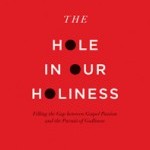 The Hole in Our Holiness: Filling the Gap Between Gospel Passion and the Pursuit of Godliness by Kevin DeYoung. Of all the young and popular authors today, DeYoung is probably my favorite. His works are always full of wit, wisdom, and “ruthless Bible-centeredness” (to adjust Piper’s endorsement of this book). I think this is the fourth time I’ve read The Hole in Our Holiness in two years and I’m always challenged afresh in the pursuit of godliness. I love his attention to the breadth and diversity of motivations for holiness, his pastoral sensibility of treasuring a tender conscience, and his exhortation to extraordinary holiness through ordinary means. If you’ve yet to read this book, grab a copy, invite a friend to read it with you, and stir up one another to a joy-filled, purposeful striving after the holiness without which no one will see the Lord.
The Hole in Our Holiness: Filling the Gap Between Gospel Passion and the Pursuit of Godliness by Kevin DeYoung. Of all the young and popular authors today, DeYoung is probably my favorite. His works are always full of wit, wisdom, and “ruthless Bible-centeredness” (to adjust Piper’s endorsement of this book). I think this is the fourth time I’ve read The Hole in Our Holiness in two years and I’m always challenged afresh in the pursuit of godliness. I love his attention to the breadth and diversity of motivations for holiness, his pastoral sensibility of treasuring a tender conscience, and his exhortation to extraordinary holiness through ordinary means. If you’ve yet to read this book, grab a copy, invite a friend to read it with you, and stir up one another to a joy-filled, purposeful striving after the holiness without which no one will see the Lord.
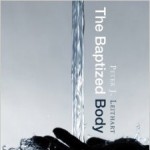 The Baptized Body by Peter Leithart. Every month I meet with a group of pastors in our county for lunch and some “affectionately contentious fellowship.” One brother whom I particularly enjoy hanging out with is a voluminous reader and never ceases to suggest a title I “must read” on a given topic. A few months ago we were talking about baptism and he said, “You gotta read Peter Leithart and The Baptized Body.” Knowing my skepticism toward all things Federal Vision, he must have assumed I wasn’t going to buy a copy so he sent one in the mail. I thus felt duty-bound to read Leithart’s book-length answer to the question of, “Does baptism do anything to the baptized?” Leithart says, “Yes!” and I agree. We just disagree on what it actually does. Leithart goes father than I’m willing to go by saying the baptized are made partakers of all the benefits of Christ, even if they don’t truly believe in the Lord Jesus. Anyone familiar with Leithart and the Federal Vision hullabaloo of the last decade or so won’t find anything surprising here.
The Baptized Body by Peter Leithart. Every month I meet with a group of pastors in our county for lunch and some “affectionately contentious fellowship.” One brother whom I particularly enjoy hanging out with is a voluminous reader and never ceases to suggest a title I “must read” on a given topic. A few months ago we were talking about baptism and he said, “You gotta read Peter Leithart and The Baptized Body.” Knowing my skepticism toward all things Federal Vision, he must have assumed I wasn’t going to buy a copy so he sent one in the mail. I thus felt duty-bound to read Leithart’s book-length answer to the question of, “Does baptism do anything to the baptized?” Leithart says, “Yes!” and I agree. We just disagree on what it actually does. Leithart goes father than I’m willing to go by saying the baptized are made partakers of all the benefits of Christ, even if they don’t truly believe in the Lord Jesus. Anyone familiar with Leithart and the Federal Vision hullabaloo of the last decade or so won’t find anything surprising here.
 An Officer and a Spy by Robert Harris. Have you heard of the Dreyfus Affair? If not, you are missing out on one of the more fascinating legal and political scandals that rocked the western world at the turn of the 20th century. In An Officer and a Spy the brilliant Robert Harris gives us a historically informed narrative of that most salacious of events. The book cover rightly captures the immense tension by saying, “A whistle-blower. A witch hunt. A cover-up. Secret tribunals, out-of-control intelligence agencies, and government corruption. Welcome to 1890s Paris.” Alfred Dreyfus has been convicted of treason, sent off to prison on Devil’s Island, and publicly degraded from military rank. Harris focuses his retelling on Georges Picquart, the venerable investigator who lost his reputation and nearly his life in pursuit of the truth about Dreyfus. If you don’t know the history behind this story resist the temptation to look it up on Wikipedia, buy a copy of Harris’ novel, and find yourself enthralled.
An Officer and a Spy by Robert Harris. Have you heard of the Dreyfus Affair? If not, you are missing out on one of the more fascinating legal and political scandals that rocked the western world at the turn of the 20th century. In An Officer and a Spy the brilliant Robert Harris gives us a historically informed narrative of that most salacious of events. The book cover rightly captures the immense tension by saying, “A whistle-blower. A witch hunt. A cover-up. Secret tribunals, out-of-control intelligence agencies, and government corruption. Welcome to 1890s Paris.” Alfred Dreyfus has been convicted of treason, sent off to prison on Devil’s Island, and publicly degraded from military rank. Harris focuses his retelling on Georges Picquart, the venerable investigator who lost his reputation and nearly his life in pursuit of the truth about Dreyfus. If you don’t know the history behind this story resist the temptation to look it up on Wikipedia, buy a copy of Harris’ novel, and find yourself enthralled.
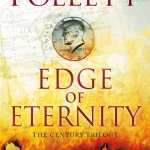 Edge of Eternity by Ken Follett. Edge of Eternity is the final entry in Follett’s smashingly successful “The Century Trilogy” and it’s also his most ambitious. At the risk of over-generalizing Fall of Giants dealt with World War I era and Winter of the World handled the World War II era. So what’s left for this final volume? The Cold War. While Edge of Eternity covers the swath of 1961-2008, more than 800 of the book’s nearly 1,100 pages are set between 1961 and ’68. Khrushchev, the Kennedys, Martin Luther King Jr., civil rights, and the Berlin Wall dominate the narrative with occasional forays into rock ‘n roll and the movement of free love. It’s all handled in typical Follett fashion: a unified tale told through the dual lenses of love and heartbreak. The sheer amount of time Follett covers ends up making the book more about breadth than depth, but Edge of Eternity is nevertheless a satisfying conclusion to a brilliant trilogy.
Edge of Eternity by Ken Follett. Edge of Eternity is the final entry in Follett’s smashingly successful “The Century Trilogy” and it’s also his most ambitious. At the risk of over-generalizing Fall of Giants dealt with World War I era and Winter of the World handled the World War II era. So what’s left for this final volume? The Cold War. While Edge of Eternity covers the swath of 1961-2008, more than 800 of the book’s nearly 1,100 pages are set between 1961 and ’68. Khrushchev, the Kennedys, Martin Luther King Jr., civil rights, and the Berlin Wall dominate the narrative with occasional forays into rock ‘n roll and the movement of free love. It’s all handled in typical Follett fashion: a unified tale told through the dual lenses of love and heartbreak. The sheer amount of time Follett covers ends up making the book more about breadth than depth, but Edge of Eternity is nevertheless a satisfying conclusion to a brilliant trilogy.
Click here to find other entries in the Recent Reads series.
In For the Glory of God: A Biblical Theology of Worship Daniel Block defines true worship as “reverential human acts of submission and homage before the divine Sovereign in response to his gracious revelation of himself and in accord with his will.”
In light of this definition he concludes, “Therefore, promoting worshipers’ awe and reverence before God must be a primary goal of those who lead worship.” And so he concludes the book with a series of exhortations for anyone that would lead God’s people in worship. These exhortations are brilliant and well worth pastoral meditation.
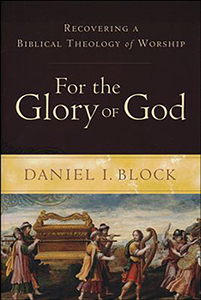 Yesterday I finished Daniel Block’s magnificent volume For the Glory of God: A Biblical Theology of Worship. We need more books like this: rigorously exegetical and thoroughly pastoral.
Yesterday I finished Daniel Block’s magnificent volume For the Glory of God: A Biblical Theology of Worship. We need more books like this: rigorously exegetical and thoroughly pastoral.
“True worship involves reverential human acts of submission and homage before the divine Sovereign in response to his gracious revelation of himself and in accord with his will,” says Block. With that definition in place he proceeds to helpfully treat a topic of worship in each chapter, tracing its development across redemptive history. For example, he takes on things like, “The Object of Worship,” “The Subject of Worship,” “The Ordinances as Worship,” “Prayer as Worship,” and “The Drama of Worship.” At the end of each chapter he offers contemporary reflections on how to apply the truth just studied.
When I scanned the chapter on “Music as Worship” I noticed that Block’s practical reflections were almost three times as long as those on any other topic. And for good reason. He writes,
I devote more space to application here than in preceding chapters because music has become arguably the most divisive factor in North American evangelicalism. Too often in worship wars, pragmatism (‘What do people want?’) and personal taste (‘What do people like?’), rather than biblical perspectives or theology, drive the discussion, and music in worship is often designed to satisfy those whose worship is unacceptable to God. To achieve the highest administrative goal, that people will return next Sunday, the music must create a certain mood, and the service must engage attendees like a theatrical performance or concert.
Delighted – if not intoxicated – by the crowds, we may be oblivious to the reality that a packed house may be proof of disingenuous (calculated) worship rather than worship acceptable to God. (236)
I trust that whets your appetite enough to purchase the book, but on the outside chance it doesn’t, let me show just how useful Block can be.
After surveying the biblical landscape on music as worship one of Block’s main applications is, “Evangelicals must rediscover that truly worshipful music is primarily congregational and unites the body of Christ.” He’s absolutely right. How can we increase the unity of our church’s worship through song? The Wheaton professor gives five considerations.
Amen. Do yourself a favor and grab a copy of For the Glory of God. It will be of immense benefit for your church and ministry.
I love 9Marks. Their resources are continually thought provoking and oh so useful, and the latest edition of the 9Marks Journal, “The Church Singing“, is no exception.
The father and son duo of David and Jonathan Leeman offer an article entitled “My Congregation Barely Sings; How Can I Help?” and it is striking in practical wisdom. They write,
If church leaders want congregations that will really “speak to one another in psalms, hymns, and spiritual songs” (Eph. 5:19), they will have to work at it. They will have to try things that might seem strange or unnatural for people who are accustomed to sitting quietly and watching the performance on stage. Here are a few tips, many of which, no doubt, fall into the realm of prudence.
But they don’t actually provide just a few tips, they provide 18 of them! All 18 are sound, but here are two of my favorites:
Choose “congregational” rather than “performance” songs. Here is a general (not absolute) principle: the more a song depends on the musical accompaniment and cannot be sung by a couple of children in the car on the way home, the more performance-oriented and less congregational it probably is. Congregational songs tend to have singable and memorable melodies. Just because a Christian artist has created something wonderful does not mean it is appropriate for the congregation. The melody may not be very melodic. It may be too high, too low, or wide of range. It may be too rhythmic, perhaps syncopated in a way that’s difficult for untrained singers. It may be too complex through bridges, tags, or multiple keys. Such music might sound wonderful with the recorded accompaniment. Maybe the praise band can perform it just fine. But the more a congregation needs the musicians up front to get through a song, the more you can expect them to mouth the words while watching the band do its thing.
Regularly remind the congregation that they are the primary instrument in corporate worship. If they don’t sing with gusto, musical worship won’t happen. That doesn’t mean acting like a cheerleader at a pep-rally: “Okay, let’s really sing…I want to hear you…I know you can sing louder!” Such leadership detracts from the seriousness of the music, and doesn’t treat their singing as a genuine spiritual expression of love, thanksgiving, and praise. Ultimately, congregational singing should be as natural as words of awe before an unusual sunset, or words of mourning with a hurting friend. Still, congregations must be taught that it is their responsibility to sing, and to teach one another through song. They must be taught to gather expecting to sing.
Head on over to the 9Marks site and read all 18 for yourself.
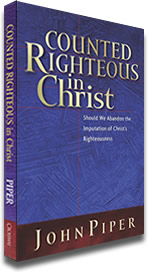 Every once in a while I come across a section of a book that makes the given title worth its weight in gold.
Every once in a while I come across a section of a book that makes the given title worth its weight in gold.
John Piper’s Counted Righteous in Christhas just that kind of gold-layered section, one titled “Growing a Church without a Heart for Doctrine.” Spend the next 3-4 minutes and give some ballast to your understanding of the church’s worship:
[T]he older I get, the less impressed I am with flashy successes and enthusiasms that are not truth-based. Everybody knows that with the right personality, the right music, the right location, and the right schedule you can grow a church without anybody really knowing what doctrinal commitments sustain it, if any. Church-planting specialists generally downplay biblical doctrine in the core values of what makes a church ‘successful.’ The long-term effect of this ethos is a weakening of the church that is concealed as long as the crowds are large, the band is loud, the tragedies are few, and persecution is still at the level of preferences.
But more and more this doctrinally-diluted brew of music, drama, life-tips, and marketing seems out of touch with real life in this world–not to mention the next. It tastes like watered-down gruel, not a nourishing meal. It simply isn’t serious enough. It’s too playful and chatty and casual. It’s joy doesn’t feel deep enough or heartbroken or well-rooted. The injustice and persecution and suffering and hellish realities in the world today are so many and so large and so close that I can’t help but think that, deep inside, people are longing for something weighty and massive and rooted and stable and eternal. So it seems to me that the trifling with silly little sketches and breezy welcome-to-the-den styles on Sunday morning are just out of touch with what matters in life.
Of course, it works. Sort of. Because, in the name of felt needs it resonate with people’s impulse to run from what is most serious and weighty and what makes them most human and what might open the depths of God to their souls. The design is noble. Silliness is a stepping stone to substance. But it’s an odd path. And evidence is not ample that many are willing to move beyond fun and simplicity. So the price of minimizing truth-based joy and maximizing atmosphere-based comfort is high. More and more, it seems to me, the end might be in view. I doubt that a religious ethos with such a feel for entertainment can really survive as Christian for too many more decades.
Amen.
Get every new post delivered to your Inbox
Join other followers